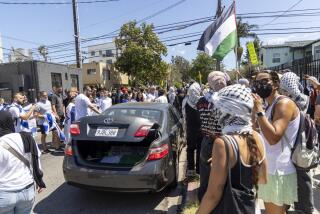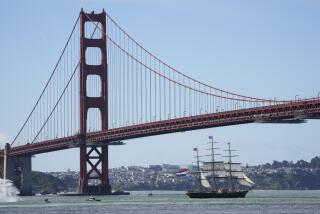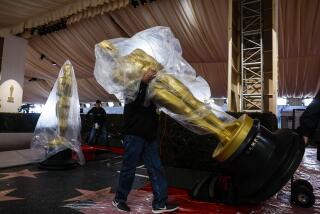Police Shift Strategy on Protests for Gay Rights : Marches: Demonstrators who illegally block traffic will be arrested. Officials say the change was spurred by complaints from motorists.
- Share via
In a shift of tactics decried by gay rights activists, Los Angeles police say they will arrest protesters who illegally block traffic in ongoing protests against Gov. Pete Wilson’s veto of a bill banning job discrimination against homosexuals.
The change was occasioned, police said, by complaints from frustrated motorists stranded in traffic jams caused by demonstrations that started Sept. 29 when Wilson vetoed the bill.
The noisy, sometimes spontaneous protests have disrupted traffic at various places, including Los Angeles International Airport, the Hollywood Bowl and the Beverly Center, as well as on streets from West Hollywood to the San Fernando Valley.
The first public indication of the policy change came Tuesday at a meeting of the Police Commission. If protesters want to stage full-scale demonstrations in the streets, Police Chief Daryl F. Gates told the panel, then the marchers must obtain parade permits.
Police officials said that under the new tactic, demonstrators who illegally block traffic will be arrested and cited for a permit violation.
In the past, police have concentrated on making sure no violence or property crimes occurred, and on keeping traffic moving, LAPD spokesman Lt. Fred Nixon said.
But, he said, “some (motorists) were inconvenienced well beyond what they considered to be reasonable.” Police officials said they received many such complaints.
“I’m sympathetic to traffic problems,” responded Roger Coggan, legal services director of the Gay and Lesbian Community Service Center, which has been active in the demonstrations. “But hopefully the LAPD will continue to act with the sort of restraint they have acted with in the last two weeks.”
David Smith, spokesman for the center, said he feared the change may result in misunderstandings and even police violence against demonstrators.
“Our main concern is that people not get hurt,” Smith said.
Police officials said the new approach does not prohibit protesters from exercising their constitutional right to march along sidewalks and across streets, actions that do not require a parade permit.
Only those who illegally block streets or commit crimes will be cited, Cmdr. Frank Piersol said. A demonstrator who simply “puts a foot in the street all of a sudden would not become subject to arrest,” he said.
Police officials said they want to ensure that both police and protesters get the message about the change before they meet on the streets.
“Everybody wants to avoid a confrontation,” Police Commissioner Michael Yamaki said, “and I’m hoping that cooler heads will prevail and that the organizers can get their point across without blocking traffic.”
More to Read
Sign up for Essential California
The most important California stories and recommendations in your inbox every morning.
You may occasionally receive promotional content from the Los Angeles Times.













